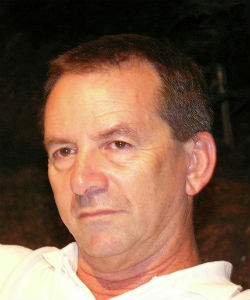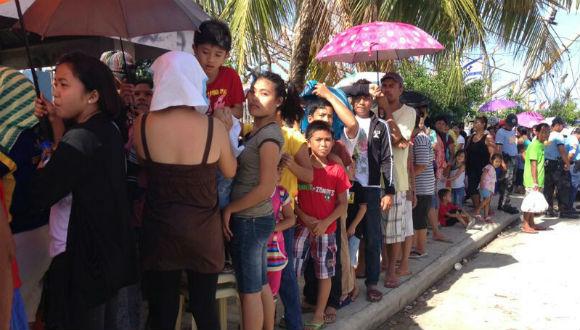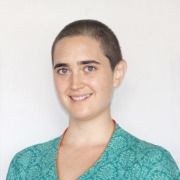Message from the Philippines
He held command positions at Israeli field hospitals in Rwanda in 1995, at the 1988 Armenian earthquake and in Haiti in 2010. Now, Prof. Kobi Peleg (pictured below), director of Tel Aviv University's executive and international master's programs in Emergency and Disaster Management at the School of Public Health, Sackler Faculty of Medicine, describes the current IDF humanitarian mission in the Philippines in a personal message from the field:
 "I've come out to the disaster zone in the Philippines as part of the IDF hospital team.
"I've come out to the disaster zone in the Philippines as part of the IDF hospital team.
"My role is to coordinate the cooperative work of, and reciprocal relations between, the Israeli delegation and all the other various agencies and bodies such as the United Nations, the World Health Organization, the Philippines Ministry of Health, and local medical authorities.
"Prior to the IDF's arrival, the northern section of the island of Cebu was identified as having suffered significant damage from the typhoon. There was hardly a roof left intact in the entire area, many trees had been uprooted, houses had been destroyed, and the infrastructure had completely collapsed.
"The IDF field hospital deployed in Cebu's Bogo City, a city of 80,000 inhabitants, serves a population of around 230,000 people. So far, the city still has no electricity. Just think of the implications for a hospital of a city or region without electricity – in terms of operating rooms and intensive care, refrigerators, and air conditioning in an area of intolerable heat and humidity of over 85%.
 "The IDF field hospital comes with its own independent resources for every aspect: generators, medical equipment including operating theaters, X-ray and intensive care machines, water, food and so on.
"The IDF field hospital comes with its own independent resources for every aspect: generators, medical equipment including operating theaters, X-ray and intensive care machines, water, food and so on.
"We landed on Wednesday, November 13, arriving in Bogo City in the evening. The hospital already began receiving patients on Thursday afternoon. In the first week, the hospital treated over 1,700 patients, with a staff of around 60 medical personnel.
"Since a great many entities, both local and international, are involved in major disasters in different ways, today there are entire agencies in the United Nations as well as in the countries themselves dealing with the issue of coordination at times of emergency. UNDAC (United Nations Assessment and Coordination) is the best-known of these agencies, and UNDAC experts – myself among the four in Israel – go to the scene of disasters to utilize our know-how in disaster coordination.
"So, for example, we have to cooperate with the various medical organizations operating in the area, both to ensure that they send us the injured and sick requiring our attention as quickly as possible, and to enable us to send them patients that we cannot treat, but that others could. Here in the Philippines, this coordination is being carried out very quickly, which is of considerable help in enabling us to act efficiently.
"When a field hospital is set up around a week after the event, most of the medical care provided is routine and community medicine – humanitarian aid in its fullest sense – together with treatment of the remaining people injured in the disaster itself. The public sees those providing treatment at the hospital as angels, and it's not difficult to see why.
"The medical staff's commitment is wholehearted. They provide treatment, perform surgery, deliver babies and carry out complex tasks from dawn till dusk. And with any patient for whom they cannot find a solution, either at our IDF hospital or the local hospital, they come running to me to arrange evacuation and admission to the island's central hospital, some three hours’ drive away. Each of these cases has to be coordinated with the provincial health minister, who has repeatedly said that she has never seen such a caring approach to every patient as that of our Israeli medical team.
"When a family was asked to pay money that they did not have for a toddler's surgery, the members of the Israeli medical team immediately offered to contribute it from their own pockets, but here too the work of coordination did the job. We turned to the JDC and told them about a two-year-old girl with a tumor behind the eye that had affected her vision, and in the future would affect her brain and lead to a painful death because her parents were not able to organize payment of 15,000 pesos in local currency. The JDC didn't think twice, and immediately contributed the money for the surgery. The little girl will shortly be undergoing surgery in the big city, and we hope that – as a result – one more young life will be saved for a relatively small sum. This is just one of many examples.
"One of the main problems in operating a field hospital in a disaster area is the vacuum that is left on the day of its departure. In order not to create a situation where people feel abandoned, we have coordinated with a number of international medical bodies to replace us next week, after an orderly handover. American, German-Austrian and Japanese organizations will be taking over from us. And so we will leave the people here in good and capable hands."
Tel Aviv University faculty member Prof. Kobi Peleg, PhD, MPH, is the Director of the National Center for Trauma & Emergency Medicine Research of the TAU-affiliated Gertner Institute for Health Policy & Epidemiology, Chaim Sheba Medical Center (Tel Hashomer). He is one of the co-founders of emergency and disaster management studies at the University's School of Public health, and leads research and education activities in various fields of trauma. Prof. Peleg earned his PhD in Health Administration and Policy, with a focus on Emergency Medicine, from Ben Gurion University of the Negev, and his master’s in Public Health from the Uniformed Services University of the Health Services in Bethesda, Maryland.
Prof. Peleg has vast practical experience in disaster management having served as head of the medical branch of Israel’s civil defense forces during the first Gulf War; head of Operation, Training and Organization of the IDF Medical Corps; and in supervisory positions at Israeli field hospitals around the world.






